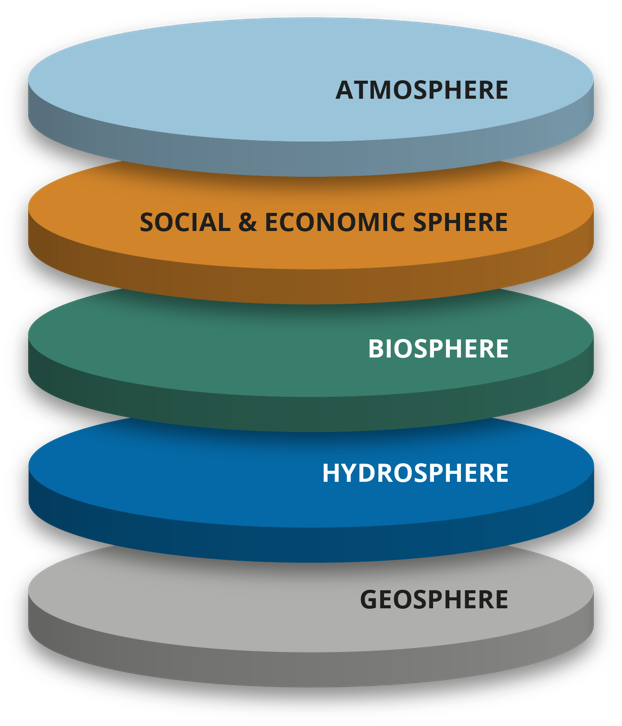Why do we need eLTER?
In a world subject to constant global change, multiple stressors act simultaneously on ecosystems at different spatial and temporal scales - often associated with significant losses of biodiversity and ecosystem services to human society. While such effects are well studied in the short term, little is known about long-term effects of the overall system and overarching relationships and feedback between climate, water balance, plants, animals, etc. In order to close these knowledge gaps and develop solution options, the complex environmental systems need to be observed on a long-term basis in order to better understand them.
The innovative approach of eLTER consists of a "whole system approach" that includes humans.
In this approach, eLTER covers the various spheres from the geosphere to the atmosphere and their respective components. Socio-economic aspects and e.g. environmental chemicals are also included as standard observations in eLTER.
What is eLTER's mission?
We investigate integrated human-nature systems using modern methods in a holistic approach - the "whole system approach" - and thus aim to gain insights that help us to better understand the complex interrelationships and derive solutions for the protection, conservation and restoration of nature. With our infrastructure and transdisciplinary expertise, we provide the scientific capacity to improve our understanding of the combined impacts of climate change, biodiversity loss, land degradation, pollution and unsustainable resource use on European terrestrial, freshwater and coastal ecosystems.
Through this approach and the involvement of different stakeholders, we provide a solid basis for evidence-based policy decisions and strategies to tackle current and future environmental problems.
How is eLTER anchored at UFZ?
Germany, supported by the Federal Ministry of Education and Research (BMBF), has the leading role in the coordination and development of eLTER which is executed by the eLTER Head Office at UFZ. Thus Germany's involvement in eLTER RI sends out a signal to the other European partner countries.
Already for a long time UFZ has an active role as a member of the German network for long-term ecological-ecosystem research
LTER-D
. The
TERENO Observatory
Harz / Central Germany Lowlands with the Bode catchment, biodiversity research focused sites and the experimental station Bad Lauchstädt (GCEF) is part of
LTER-D sites
. The UFZ observatory has registered the sites Hohes Holz, Holtemme and Rappbode dam as future eLTER areas.
Due to this long-standing connection and the strategic importance of eLTER, the Head Office is located at the UFZ. It coordinates the EU funded projects
eLTER Preparatory Phase Project (PPP)
,
eLTER Advanced Community Project (PLUS)
and
eLTER EnRich
, enabling the building of eLTER RI and its scientific application.
read more…
As the UFZ offers a very broad portfolio of disciplines in environmental research, its expertise makes it ideally suited to coordinating eLTER with its interdisciplinary and holistic approach to environmental observation. This is reflected both in the participation of UFZ experts from various subject areas in the selection of "Standard Observations" and the associated measurement protocols as well as in the interest in offering future services within the eLTER service portfolio (e.g. access to and management of data, training offers, transnational access to research sites, etc.).
How is eLTER financed?
The development and implementation of eLTER is currently being driven forward in two complementary EU-funded projects, supported by a third EU-funded project and the BMBF.
- The eLTER PPP project is coordinating the detailed elaboration and political decision-making at European and national level that will enable the implementation of the eLTER RI as a separate legal entity.
- The eLTER PLUS project tests the emerging research infrastructure on the basis of case studies. In addition, eLTER PLUS will specify the standardized methods, protocols and variables that will be collected at eLTER sites (eLTER Standard Observations) and those services that will be made available after the implementation of the research infrastructure.
- Through eLTER EnRich, eLTER PLUS and PPP will be better interlinked, especially in the planning of the IT infrastructure (data processing, provision, management, etc.) and the development of core services. COVID-related delays will also be compensated for.
- The BMBF is funding a position in the Head Office until the infrastructure is completed.
